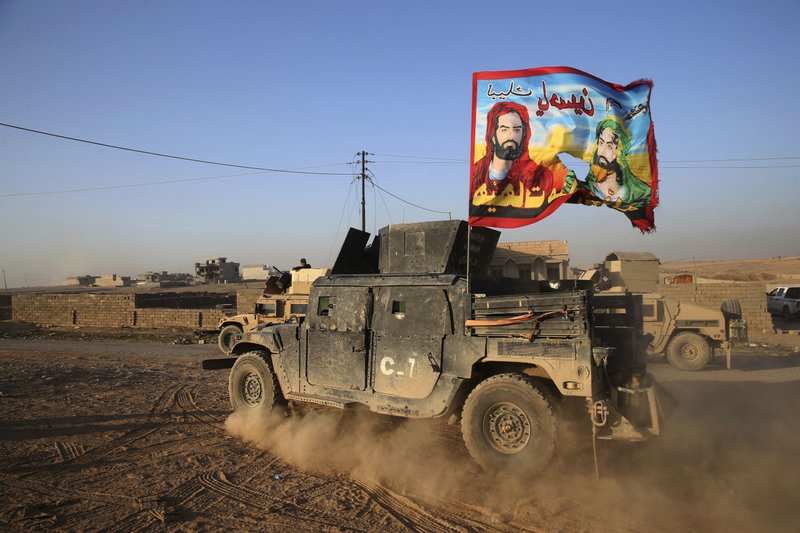AIN AL-JEHESH, Iraq -- On the road to Tal Afar, an Iraqi city near Syria that's been key to sectarian catastrophes in both countries over the past decade, a rag-tag group of Shiite troops has advanced against Islamic State militants.
To Iraqi minorities, especially those in Tal Afar, those forces advancing under the Shiite banner have raised alarm.
Officials and military men say confidently that the Iraqi army will lead the charge on the city, keen to avoid provoking sectarian frictions. In staging areas for the offensive, however, state-sanctioned Shiite militias and army units aligned with their cause run the show, positioning themselves to control the territory after the fight. As such, fresh domestic and regional conflict is feared.
The militias, which also are backed by Iran, have at the very least antagonized local Sunnis in the past -- a track record that does not bode well for Tal Afar's current population of mostly Sunni Turkmen. And in previous Sunni areas retaken from the Islamic State such as Fallujah, they have been accused of extrajudicial killings, ethnic cleansing and other abuses against civilians -- charges they deny.
"There is some political issue interfering with the war -- some people say they don't want the Hashd to enter the city alone, others say they want the army," said Kazem Ali, a fighter with the Hashd al-Shaabi, or Popular Mobilization Forces, which has sent thousands of volunteers to the city's outskirts.
"But we have a plan, and everybody will be surprised that suddenly there is no more Daesh," continued the 60-year-old, using the Arabic acronym for the Islamic State as he headed to the front with dozens of comrades near the village of Ain al-Jehesh.
Militia commanders choose more tempered words, agreeing with the government and army's position that they will merely support the troops' assault.
But with Iraqi army resources dedicated to Mosul, the main battleground with the Islamic State, also known as ISIS, the militias were given free reign over the city's western approach, where they hope to establish a long-term presence and influence.
The paramilitaries control the road to Tal Afar, with their flags and checkpoints lining it and army units passing only with permission. Guards said the Iraqi military has no jurisdiction along the road, while fighters headed to the front said they were ready to take the battle to Syria, home to the capital of the Islamic State's self-styled caliphate.
Prime Minister Haider al-Abadi says an investigation is underway into past abuses by militiamen, and that scores have been sentenced to death and hundreds to long prison terms. He said this week that the plan now is to bring them all "under the control of the Iraqi security forces."
The situation has even raised concerns in Turkey, where leaders have spoken out since 2003 about the fate of ethnic Turkmen in Iraq. Turkish President Recep Tayyip Erdogan has warned that the militias could prompt a Turkish response if they "terrorize" the area's Turkmen. He has deployed tanks to Silopi, a nearby Turkish town on Iraq's northern border in a threat of intervention.
Near the front line at the Tal Afar air base, still regularly shelled by Islamic State mortar fire, Pvt. Abdulkarim Kassem of the 92nd Brigade said his unit was ready to enter the city along with the "holy Hashd," then fight its way up to the Syrian border.
Maj. Gen. Emad Silawi, commander of the 15th Division, said he has fought in the past with the men of the 92nd, and sees them as having a "high morale ... strong and combative." Those troops will enter the city first, he said, although he admitted that it is possible the Shiite militiamen will follow.
In Mosul, fighting continues. Iraqi special forces fighting Islamic State militants there seized a new neighborhood Friday and took full control of a densely populated neighborhood, where troops happened upon a residential complex for Islamic State fighters, according to two Iraqi field commanders.
Lt. Col. Muhanad al-Tamimi of the special forces said his men were now in full control of the Zohour neighborhood, more than a week after they first entered the district.
He said his men also captured the neighborhood of Qadisiyah-2, bringing to 23 the number of neighborhoods retaken by the special forces in the eastern sector of the city since the campaign to recapture Mosul began Oct. 17.
Brig. Gen. Haider Fadhil of the special forces later told The Associated Press Friday that his men had taken over two adjacent, two-story houses in Zohour where Islamic State fighters lived. In the garden, they found life-sized cardboard cutouts for target practice, he said.
The walls inside the two houses were adorned with posters of RPGs, assault rifles and artillery shells. Some posters had instructions for snipers and RPG users, he said. Fliers bearing the names of the fighters who slept in each room were plastered on doors, he added.
Information for this article was contributed by Qassim Abdul-Zahra of The Associated Press.
A Section on 12/03/2016

